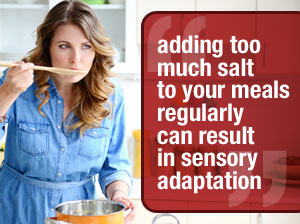5 Habits That Affect Your Sense of Taste

For years, cigarette smoking has been linked to a decreased sense of taste. It’s such a detriment that industry leaders often prefer professional food tasters not smoke at all. At minimum, they are required to abstain from smoking at least 30 minutes prior to a tasting.
In terms of affecting your sense of taste, however, cigarettes aren’t the only culprit. There are a host of other habits that can impact taste buds, both positively and negatively.
1. Eating too much salt
Salty is one of the five basic tastes, and adding salt to a dish is a common way to flavor food. It’s been found that adding too much salt to your meals regularly can result in sensory adaptation – meaning that over time you’ll need more salt to taste the saltiness that was once satisfying.
2. Exercising regularly
Your sense of smell plays an important role in how you taste food. According to a study published in 2013, a quarter of adults over 50 have a diminished sense of smell, demonstrating that the sense diminishes with age. The study also states that regular physical activity can prevent it from fading.
3. Drinking too many sugary beverages
As with eating too much salt, if you drink too many sugary beverages (soda, sweetened coffee or juice, it may dull your ability to taste sweetness and increase your cravings for sugar. Only a small amount of sugar is needed to impact perception of taste. You can reset your taste buds by cutting out sugar for at least a week.
4. Staying hydrated
Drinking a glass of water every hour can help prevent dry mouth. According to Evan Reiter, M.D., an otolaryngologist at Virginia Commonwealth University’s Eye & Ear Specialty Center in Richmond, dry mouth — whether due to medication or simply dehydration — can adversely affect your sense of taste.
5. Limiting your alcohol intake
Alcohol acts as a numbing agent and can temporarily numb your sense of taste. Alan Hirsh M.D., of the Smell & Taste Treatment and Research Foundation, found that your sense of smell declines as your blood alcohol level rises.
